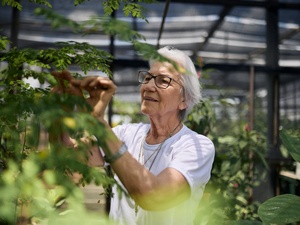Feature: UNHCR helps Somali girls make the grade
Feature: UNHCR helps Somali girls make the grade

Somali women attending lessons at the Deaf and Hearing School in Boroma, Somaliland.
PUNTLAND, Somalia (UNHCR) - Peek into most classrooms in Somalia, and you'll notice that only about one-third of the students are girls. This is a fact the UN refugee agency is trying to change through five "Girls' Initiative" projects currently underway in the country's north-east.
Education is a basic human right, according to the Universal Declaration of Human Rights, 1989 Convention on the Rights of the Child. Gender equity in schooling by 2005 and universal primary education for girls and boys by 2015 are also among the eight Millennium Development Goals set by the UN.
In Somalia, UNHCR works with non-governmental partners in Puntland (in the north-east) and Somaliland (north-west) to develop education policies, gender training, female professional skills, and to increase girls' access, retention and achievement in education.
UNHCR's education projects are part of the "Together for Girls" programme to improve Somali refugee girls' access to education and ensure a smooth continuum of education from exile to return.
Sports giant Nike contributes to the programme for Somali girls in Kenya's Dadaab camp, while UNHCR's private donors fund projects for returnee and internally displaced girls in Puntland.
The refugee agency identified worthy school projects in Puntland costing approximately $300,000, and thanks to private donors, this amount will be fully covered. The biggest donations came from private donors in the United States, Australia and Italy.
The initiatives in Puntland - which range from kindergarten level to secondary school - are crucial in a country like Somalia, where one out of eight women is literate and girls make up just 35 percent of the entire student population.
"Somali women want education to help them understand their rights, voice their problems and identify their priorities," said UNHCR Representative in Somalia Simone Wolken.
The smallest UNHCR project, at just under $5,000, is equipping a kindergarten in Sahan (Bossaso) with child-friendly furniture, drawing paper, chalk, balls, puzzles, skipping ropes and children's books.
School fees in Puntland come to about $3 or $5 a month, a huge sum for an ordinary family. When families have to make tough choices, it's the boys who get to go to school. So UNHCR is providing scholarships for 200 girls to attend local schools.
In Garowe, Puntland, the construction of proper toilets ensuring necessary privacy at Gabol Secondary School encourages girls to go to school. At the same institution, UNHCR is providing textbooks for 156 girls, and uniforms for 60 girls who are so poor they don't even have clothes for attending school. The agency is also providing paraffin and lamps for 40 girls who are too busy with household chores to do their homework during daylight hours.
"It's heart-warming to know that such a small gesture will allow girls to study at night and continue their education where otherwise they might have become discouraged and quit," said Ivana Unluova, Programme Officer for UNHCR Somalia.
Encouraged by the positive results of these school rehabilitation projects in Puntland, UNHCR has now also committed to constructing two classrooms and rehabilitating 10 others in the Hodan district of the Somali capital, Mogadishu. This will allow an additional 200 children to attend school.









